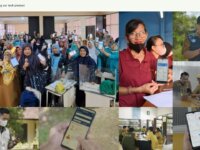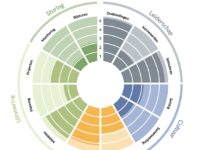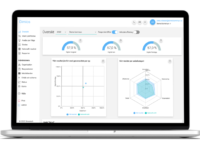GovTech Edu works with the Indonesia MoECRT to build a technology ecosystem to create an irreversible transformation for Indonesia’s education system. It includes tech platforms made available for teachers, school principals, university students & practitioners, through products like Teacher SuperApp, Education Scorecard & University Internship Matchmaking Platform. With these, the transformation to improve student learning outcomes becomes more inclusive, data driven & impact-enabling at…
Innovation Tag: Digital and Technology Transformation
e-insan is an integrated platform, offering a wide range of services based on equal opportunity and accessibility for employment and lifelong professional development. In addition, it supports data-driven decision-making processes. The platform provides job and internship opportunities, online training for employees, and many contents of career development for youth and creates a talent pool with verified data. Blockchain-supported e-insan increases efficiency and transparency in HR management.
Case Study
Turning Anticipatory Regulation from Principle to Practice: The Journey of the Regulatory Horizons…
Traditional ways of regulating are not able to keep pace with technological disruption, shifting sectoral boundaries, new types of problems and the opportunities innovation can bring. The Regulatory Horizons Council (RHC) is an independent expert committee set up the UK Government that identifies the implications of technological innovation, and provides government with impartial, expert advice on the regulatory reform required to support its rapid and safe introduction.
Discovery as a Service (DaaS) enables successful delivery of UK Policing Technology through standardised and outcome based discoveries to provide evidence and overcome inconsistency in project initiation. By employing user centric thinking, agile delivery, innovation, and multi-disciplinary teams, DaaS ensures new national technology initiatives provide beneficial capabilities to UK Law Enforcement so they safeguard the UK public. This service is the first of its kind in the Home Office.
Most Brazilian metropolises have a transport network operated by a private company which makes it difficult for transport authorities to have a bright view of the public transport functioning. TRANCITY is a public transport monitoring dashboard which integrates different sources of data, such as bus location, ticketing and cameras, providing real time and historical information that supports management, planning and the operation of public transport networks, with data driven evidence.
MiLAB - Govtech and Public Impact Laboratory, aims to contribute on the digital transformation acceleration of the public sector, by connecting it, through collaboration and open innovation strategies, with start-ups and SMEs that uses emergent technologies and innovative methodologies. MiLAB successfully specialized its activity within the public impact ecosystem, attending the high demand and global tendency of rely on digital innovator among the Government.
Case Study
Safeguarding through the Moderator Proposition – The early identification of children at risk
Safeguarding children at risk of abuse requires effective multiagency working throughout safeguarding agencies. Current arrangements have proved inadequate and have failed to deliver on the imperative for integrated working. The Moderator Proposition fully resolves these outstanding operational needs. Moderator employs AI technology, with an integrated organisational 'construct', to assemble a comprehensive 'picture of events' for conjoined working across agencies. It is an holistic innovation.
Officina is a lab for innovation in the public sector whose main objective is to catalyse the energy of young talents by offering them a transformative training programme. Officina was developed to address a triple urgency: future decision makers not perceiving the public sector as an attractive workplace; the public sector having high average age workforce and lack of innovative approaches; society at large needing a more modern and appealing public sector in this key historical moment.
A lot of innovative activities are carried out by Dutch and other governments. Unfortunately, the impact is limited. Innovations are stand alone projects, not implemented or scalable within primary processes. This reference model supports the implementation of an innovation management system for governments. The starting point is an Innovation Maturity Scan. Tooling, training and handouts are available supporting a social and process innovation transition at governmental organizations.
The Swedish Center for Digital Innovation has through a partnership with a small software development firm created a digital maturity assessment (DiMiOS) that has been nationally scaled in Sweden. DiMiOS has so far been used in over 400 public sector organizations. Through DiMiOS, public sector organizations are sharing new insights between and within municipalities, regions and agencies, increasing digital maturity in the entire sector. The assessment also acts as a data pump for research.




